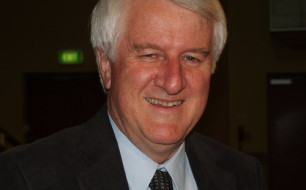Centre for Policy Development's Blog, page 73
April 7, 2013
The Daily, 2SER | 5 April
 Christopher Stone interviewed about
Decoding efficiency
Christopher Stone interviewed about
Decoding efficiency
Joel Rosenzweig interviewed Chris Stone, to further demystify the jargon and hype surrounding so-called efficiency reforms.
Sometimes, when not done with due care and consideration for results as well as resources, cuts to public spending can be False economies.
Access the interview with Christopher Stone on The Daily here via 2SER
Refugeefacts—media handbook | The truth about refugees & asylum seekers
 Experts in this complex field of refugee and immigration policy, CPD fellows John Menadue, Arja Keski-Nummi and Kate Gauthier collaborated on a unique online media resource, which seeks to clarify some of the controversy and misunderstandings which seem to persist.
Experts in this complex field of refugee and immigration policy, CPD fellows John Menadue, Arja Keski-Nummi and Kate Gauthier collaborated on a unique online media resource, which seeks to clarify some of the controversy and misunderstandings which seem to persist.
Facts may be in short supply. It appears the Australian community is seriously misinformed about asylum seekers. In its polling in March 2012 Essential Research found that 23% of Australians believe that asylum seekers coming by boat represented 25% or more of the Australian annual immigration intake. In fact, it is 1% to 2%…
Facts cited in the website – http://refugeefacts.cpd.org.au/ – draw on data published by authoritative sources such as the Lowy Institute for International Policy, United Nations High Commission for Refugees and the Australian Department of Immigration and Citizenship.
April 1, 2013
False economies, part 1: Decoding efficiency | LANDMARK REPORT
 Translating jargon into the truth about public service delivery
Translating jargon into the truth about public service deliveryCPD’s public service Research Director Christopher Stone contends that if we don’t want services to run down, we need to ‘look both ways’ before outsourcing and consider results as well as resources, when measuring success.
The next landmark report from the Centre for Policy Development’s public service program, False economies tackles the topical issue of efficiency in public service. Politicians most often address this issue with promises of sweeping cuts, but what do they actually mean when they say ‘efficiency’?
Released 3 April, the first instalment of the new report Decoding efficiency translates the jargon, and exposes errors that can actually lead to waste resulting from so-called ‘efficiency’ reforms.
‘Our public service suffers the plight of the anorexic: no matter how thin it gets there are voices saying it’s too fat. Do we really want a size zero government?’
Arguments for reform often revolve around the presumption that the private sector is necessarily more efficient and effective than the public. Is this always true? Decoding efficiency outlines six ways in which market models can ‘mess up’. It explains three different economic definitions of efficiency, and then illustrates how mere equations simply cannot fully account for success or failure in service delivery.
Especially in an election year, every Australian needs to understand this because it is their money, being spent on them, their families and the things that matter to them. ‘It’s not the size of your public sector that counts, it’s the way you use it.’
Download Decoding efficiencyDecoding Efficiency
March 26, 2013
Post Carbon Pathways report launch | Melbourne, 15 April
When: 6pm – 8pm, 15 April 2013
Where: Elisabeth Murdoch Theatre (Bldg 134), Spencer Rd, to the left of Ian Potter Museum of Art on Swanston St, University of Melbourne
The University of Melbourne will host a free public event on 15 April for ‘Post Carbon Pathways: Report launch and panel discussion on climate change leadership’ with a report overview by CPD fellow John Wiseman.
Recognition is rising that political barriers may be the biggest obstacle in transitioning to a post carbon future as the threat of disastrous climate change increases.
“Post Carbon Pathways: Creating a just and resilient post carbon future, by John Wiseman, Taegen Edwards, and Kate Luckins draws on in-depth interviews with leading international researchers, policy makers and activists on actions needed to drive the rapid implementation of large scale post carbon economy transition strategies”
Download the Post Carbon Pathways invitation | RSVP & reserve your place | Email John Wiseman
March 25, 2013
ABC Local | 19 March 2013
 Chris Bonnor, CPD fellow and author of the school education chapter in forthcoming book Pushing our luck, discusses the Australian education system with Trevor Chappell and members of the public. Bonnor comments and asks questions on private and public school preferences, funding, discipline and students’ current prospects for university or industry.
Chris Bonnor, CPD fellow and author of the school education chapter in forthcoming book Pushing our luck, discusses the Australian education system with Trevor Chappell and members of the public. Bonnor comments and asks questions on private and public school preferences, funding, discipline and students’ current prospects for university or industry.
“What’s happening in our schools? Are more parents sending their children to private schools? Politicians are saying education is a priority, but how effective is the education funding model? And are they doing the right thing by our teachers? Trevor Chappell discussed our schools with Chris Bonnor who is a Fellow of the Centre for Policy Development and co-author with Jane Caro of “What Makes a Good School” and Fellow of the Centre for Policy Development.”
March 17, 2013
Sunshine Coast Daily | 18 March 2012
Sunshine Coast Daily reporter Daniel Burdon covered CPD’s latest sustainable economy paper.
The new paper, by CPD fellow Caroline Hoisington, seeks to inform the public debate on the total worth of protecting our vulnerable marine ecosystems. Burdon’s article reiterates the gross economic, environmental and social benefits of the Marine network by highlighting Hoisington’s explanation of the parks as resource based insurance policies.
“Just as insurance premiums are far smaller than the value covered, the annual costs of running the Great Barrier Reef Park, for example, are less than 2% of what it contributes to Australia’s economy”, says Hoisington.
Download Insuring Australia’s marine future – OP26 – C Hoisington
Insuring Australia’s marine future | OCCASIONAL PAPER
This report finds that Australia’s national network of marine parks will act as an insurance policy for commercial and recreational fishing
Insuring Australia’s marine future looks at the increasing risks to Australia’s oceans, the growing evidence of the benefits of MPAs, and the low cost of managing them.
Report author, CPD fellow and former World Bank economist Caroline Hoisington contends that, ‘stronger marine ecosystems will be the basis for economic benefits to our communities and businesses’.
Global marine resources are under pressure. Oceans are damaged in much of the world by overfishing, pollution, nutrient loadings and decreased oxygen levels. Climate change adds to the risk of ecological collapse – with potentially catastrophic social and economic impacts.
Australian seas are in better condition than many, but face the same threats. As a leader in declaring a national network of marine protected areas and sanctuary zones, Australia has taken a critical step toward insuring the future of the industries and regional communities that rely on a healthy marine environment. Yet to benefit economically, Australia needs to lead the world in practice as well as on paper.
Download Insuring Australia’s marine future - OP26 – C Hoisington
Download media release for Insuring Australia’s marine future
Insuring Australia’s marine future | CPD REPORT
This report finds that Australia’s national network of marine parks will act as an insurance policy for commercial and recreational fishing
Insuring Australia’s marine future looks at the increasing risks to Australia’s oceans, the growing evidence of the benefits of MPAs, and the low cost of managing them.
Report author, CPD fellow and former World Bank economist Caroline Hoisington contends that, ‘stronger marine ecosystems will be the basis for economic benefits to our communities and businesses’.
Global marine resources are under pressure. Oceans are damaged in much of the world by overfishing, pollution, nutrient loadings and decreased oxygen levels. Climate change adds to the risk of ecological collapse – with potentially catastrophic social and economic impacts.
Australian seas are in better condition than many, but face the same threats. As a leader in declaring a national network of marine protected areas and sanctuary zones, Australia has taken a critical step toward insuring the future of the industries and regional communities that rely on a healthy marine environment. Yet to benefit economically, Australia needs to lead the world in practice as well as on paper.
Download Insuring Australia’s marine future - OP26 – C Hoisington
Download media release for Insuring Australia’s marine future
Insuring Australia’s marine future
This report finds that Australia’s national network of marine parks will act as an insurance policy for commercial and recreational fishing
Insuring Australia’s marine future looks at the increasing risks to Australia’s oceans, the growing evidence of the benefits of MPAs, and the low cost of managing them.
Report author, CPD fellow and former World Bank economist Caroline Hoisington contends that, ‘stronger marine ecosystems will be the basis for economic benefits to our communities and businesses’.
Global marine resources are under pressure. Oceans are damaged in much of the world by overfishing, pollution, nutrient loadings and decreased oxygen levels. Climate change adds to the risk of ecological collapse – with potentially catastrophic social and economic impacts.
Australian seas are in better condition than many, but face the same threats. As a leader in declaring a national network of marine protected areas and sanctuary zones, Australia has taken a critical step toward insuring the future of the industries and regional communities that rely on a healthy marine environment. Yet to benefit economically, Australia needs to lead the world in practice as well as on paper.
Download Insuring Australia’s marine future - OP26 – C Hoisington
Download media release for Insuring Australia’s marine future
Insuring Australia’s marine future | CPD research paper OP26
This report finds that Australia’s national network of marine parks will act as an insurance policy for commercial and recreational fishing
Insuring Australia’s marine future looks at the increasing risks to Australia’s oceans, the growing evidence of the benefits of MPAs, and the low cost of managing them.
Report author, CPD fellow and former World Bank economist Caroline Hoisington contends that, ‘stronger marine ecosystems will be the basis for economic benefits to our communities and businesses’.
Global marine resources are under pressure. Oceans are damaged in much of the world by overfishing, pollution, nutrient loadings and decreased oxygen levels. Climate change adds to the risk of ecological collapse – with potentially catastrophic social and economic impacts.
Australian seas are in better condition than many, but face the same threats. As a leader in declaring a national network of marine protected areas and sanctuary zones, Australia has taken a critical step toward insuring the future of the industries and regional communities that rely on a healthy marine environment. Yet to benefit economically, Australia needs to lead the world in practice as well as on paper.
Download Insuring Australia’s marine future - OP26 – C Hoisington
Download media release for Insuring Australia’s marine future
Centre for Policy Development's Blog
- Centre for Policy Development's profile
- 1 follower




